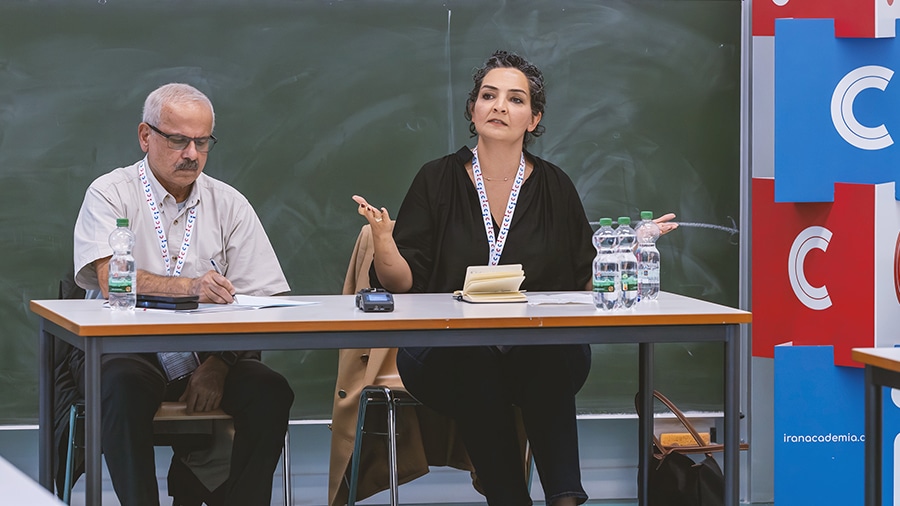The panel titled “Iranian Diaspora: Social Experiences and Political Dynamics” explores the internal dynamics and challenges within the Iranian diaspora, particularly focusing on opposition groups outside Iran. The discussions highlight how the desire for victory without a proper understanding of reality has led to conflicts and friction among opposition groups, rather than fostering unity against the Iranian regime.
Farangis Bayat
“Staging” in Opposition Politics
Katayoon Latif
Lost Connections: the Gap Between the Experiences of Iranian Immigrants and Residents During Social and Political Transformations
Moderator: Jalil Roshandel
Farangis Bayat was only able to attend this panel.
Abstracts
Farangis Bayat
“Staging” in Opposition Politics
Farangis Bayat introduces the concept of “staging” to describe the current state of opposition politics outside Iran. She argues that the Iranian political scene, particularly over the past two years, has been marked by rapid events, victories, and failures. Bayat points out that new political actors have emerged within the framework of the “opposition,” complicating the relationships within the Iranian diaspora.
The formation of groups like the “Charter” and the striking similarity in the demands of various opposition factions have not resulted in a unified front. Instead, intense conflicts and failures to move forward with a common agenda have surfaced. Bayat argues that the opposition groups are trapped in a “cognitive trap”—a disconnect between their political aspirations and the reality on the ground.
This “staging” concept illustrates how opposition forces perceive their situation: driven by competition and an overwhelming desire for victory, their strategies are shaped by the amount of attention they receive in the public sphere and online platforms. They are fixated on success, but this fixation is detached from the real political landscape.
Bayat asserts that this obsession with victory leads opposition forces to imagine themselves as “the winning power,” despite lacking any real leverage to shift the balance of political power. As a result, instead of focusing their hostility on the Iranian regime, the opposition groups turn their conflicts inward, fighting among themselves.
Katayoon Latif
Lost Connections: the Gap Between the Experiences of Iranian Immigrants and Residents During Social and Political Transformations
Katayoun Latif’s paper examines the widening gap between the experiences of Iranians living abroad and those still residing in the country, particularly in the context of recent social and political changes. Latif highlights how physical distance has caused migrant Iranians to perceive the social and political movements within Iran differently. Their understanding is shaped by social media and news headlines, which creates a barrier to fully grasping the nuances of the situation on the ground.
In contrast, resident Iranians experience these changes firsthand, leading to significant internal and external transformations. Through qualitative interviews with both migrant and resident Iranians, Latif’s research explores the differences in how these groups engage with and respond to Iran’s evolving political and social landscape.
The paper aims to shed light on the points of divergence and connection between these two groups, who, despite sharing generational and ideological similarities, have vastly different relationships with the ongoing changes in Iran.
The panel paints a picture of a fragmented Iranian diaspora, where opposition groups are mired in internal conflicts due to their unrealistic aspirations for victory. Bayat’s concept of “staging” explains the disconnect between these groups’ strategies and the realities they face.
On the other hand, Latif highlights the growing gap between the experiences of Iranians abroad and those still in the country, which further complicates the diaspora’s ability to form a unified response to the political challenges in Iran. Together, these discussions underline the complex social and political dynamics that define the Iranian diaspora today.



